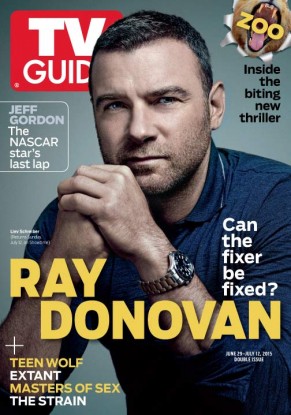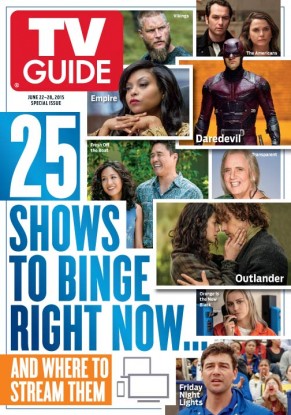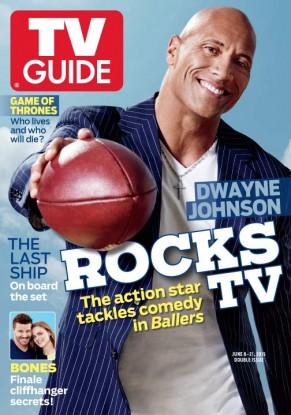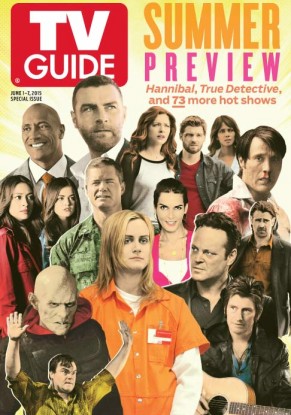Ray Donovan Returns: Can the Fixer Be Fixed?
Even when Liev Schreiber isn’t playing the title role in Ray Donovan—a cold, brooding, slay-for-pay Hollywood “fixer”—he looks like he’s about to beat the crap out of you. The man can’t help it. He’s just made that way, with his wide, glowering, don’t-mess-with-me puss and a 6-foot-3 alpha-dog body that seems impenetrable and unstoppable. Right now, on the set of the Showtime series at Sony Studios in Los Angeles, that fearsome Schreiberocity is on full display as the actor hunts for director Dan Attias to discuss a problem with the script. Oh, Schreiber has no gripe with the writing itself; just that there’s too much of it.
The scene giving him agita has Ray returning home to his family, having distanced himself for quite some time from wife Abby (Paula Malcomson) and kids Conor (Devon Bagby) and Bridget (Kerris Dorsey). It’s quickly apparent that Ray hasn’t been missed. In fact, he’s been replaced. His older brother, Terry (Eddie Marsan), has moved in and become surrogate husband and father, and for once, there’s a bit of much-needed bliss in the Donovan household. Schreiber wants Ray to react silently, rather than verbally, to this startling domestic shift, and he asks Attias if he can cut some of his lines. After a few minutes of debate, Attias says he wants the scene played as written. For a moment, Schreiber seems ready to push the issue, but he suddenly retreats from the disagreement with a good-natured shrug, mumbling, “Well, it was worth a shot” to no one in particular. And then he begins to sing…softly, sweetly.
“Don’t cry out loud. Just keep it inside, learn how to hide your feelings.”
Nearby crew members glance at one another and are not quite sure how to react, so they don’t. This clearly is no everyday happening. Schreiber continues his song, with growing poignancy and bravado.
“Fly high and proud! And if you should fall, remember you almost had it aaaalllll!”
He nearly, but not quite, hits the final note and is greeted with more puzzled silence. “What’s that song from?” he asks. No one knows.
“Les Miz?” someone finally offers meekly.
“No, I mean who sang it?” Schreiber asks. “Was it Debby Boone? I’ve had that song playing in my head since Season 1 and can’t make it stop.”
With good reason. “Don’t Cry Out Loud”—which, for the record, was a major hit back in the ’70s for Melissa Manchester—could be Ray’s personal theme song. After all, the emotionally constipated ruffian and chronic philanderer never met a feeling he couldn’t stuff deep down into the darkest recesses of his twisted, Irish Catholic psyche. As a child, Ray was sexually abused—along with his younger brother, Bunchy (Dash Mihok)—by the family priest back home in South Boston, a trauma that still haunts them and has robbed Ray of any ability to feel intimacy. And the hits just keep coming: At the end of last season, Ray’s lover Kate (Vinessa Shaw) was killed by his trusted right-hand man, Avi (Steven Bauer), in a whack job ordered by Ray’s boss and father figure, attorney Ezra Goldman (Elliott Gould). Worse yet, Ray found out Abby was having an affair with a young, handsome LAPD detective. Now there’s hell to pay.
When Season 3 begins, several months have passed. “Ray has cut himself off from his family and the people he works with,” Schreiber says. “He can’t forgive Abby. He can’t forgive Avi and Ezra. And he still can’t forgive his dad, Mickey [Jon Voight], for abandoning the family all those years ago, which opened the door to the pedophile priest. In Ray’s mind, his entire world has transgressed against him and he’s holding everyone accountable.”
Ray once earned top dollar protecting Ezra’s celebrity clients—covering up their scandals and burying their skeletons (sometimes literally)—but he’s now working freelance, picking up scraps whenever he can. “Ray no longer wants to be cleaning up after people who don’t deserve it,” Schreiber says. “He’s done being treated like a second-class citizen, like a thug. He’s looking to legitimize himself and climb the social ladder.”
That opportunity comes when Ray is offered a full-time gig handling crises for the filthy-rich Finney family and their many entertainment holdings. The clan’s oily patriarch, Andrew (Ian McShane), is getting ready to step down as CEO and will appoint as successor either his feckless son, Casey (Guy Burnet), who runs the Finneys’ movie studio, or his ruthless daughter, Paige (Katie Holmes), who heads their sports agency.
“There’s no doubt Paige is more equipped and powerful,” says executive producer and showrunner David Hollander. “But Andrew has an emotional connection to his son that he doesn’t have with his daughter. He’s impressed by Paige but loves Casey.” The elder Finney is also aware that Paige will go to any lengths—however disgusting and illegal—to get what she wants, and he fears she’s a threat to him. This has Ray caught between protecting Andrew’s secrets and helping Paige achieve her lofty, and potentially lucrative, goal of acquiring an NFL team and bringing it to L.A.
“Nothing intimidates Paige,” says Holmes, who drew inspiration for her badass character—a juicy change of pace from her many sweetheart roles—by studying Faye Dunaway’s Oscar-winning turn as a cutthroat TV executive in Network. “Paige is hugely ambitious and can handle herself in any situation, but she does have cracks. Over time, you’ll see why she’s so alone and why she’s so willing to do inappropriate things. Some people are going to think she’s crazy, and,” Holmes adds with a laugh, “I might be one of them.”
This being Ray Donovan, lustful sparks will fly between fixer and fixee, of course. “At first, Paige is resentful and untrusting of Ray,” Holmes says. “He’s a stranger, and the Finneys always have people trying to take advantage of them. But she starts to see how she can use Ray to her advantage and that they are very similar. They are both lost souls. He’s exciting to her.”
Life for the other Donovans is no less wild this season. Shy, sexually dysfunctional Bunchy will get his mojo going when he falls for a wrestler-dominatrix (Alyssa Diaz), and Terry starts out behind bars after being nabbed in a botched robbery. “Terry’s Parkinson’s disease is worsening now that he’s without proper medical care, and he’s angered a bunch of Aryan Nations inmates who want him dead,” Marsan says. “But he’d rather remain in prison than be sprung by Ray and be dependent on him. If Terry survives, he’ll be in a wheelchair within two years. He wants it all to end.”
Mickey, meanwhile, is living off his racetrack winnings in a hooker-infested apartment complex in the San Fernando Valley. He takes a shine to one of the working gals (Fairuza Balk) and often babysits her young daughter (Shree Crooks), a not-so-talented showbiz wannabe up for the role of Shirley Temple in a movie biopic. Before long, Mickey is feeling downright fatherly and decides to become a pimp, with a little cocaine business on the side.
“No one’s going to take care of Mickey, and being a criminal just comes natural to him,” says Voight. “He’s envious of Ray because the guy seems to have so much power. Mickey needs to show his son that he can make it, that he can be an important person.” Of course, Voight concedes, “Mickey is always stepping in s–t. He has big dreams but never much success, which is apparent to everyone but himself.”
Then there’s Abby, who will beg Ray for absolution—and get nowhere. “Ray is such a hypocrite, screwing women left and right,” says Malcomson. “But he doesn’t fall in love with them. Ray may be emotionally and physically distant, but he’s not going to leave Abby, certainly not while the kids are still in the house.”
However, Abby will leave Ray this season, at least temporarily, when she tries to reconnect with her former self. “She goes home to her Southie roots in Boston and checks back in with her family, which is quite a circus,” Malcomson says. “It’s a chance to see who Abby really is, as opposed to the lonely, frustrated woman who is out of her element in Hollywood.” We meet her brother and sister and an old boyfriend, as well as her father, who is “vile and unnecessarily cruel, a real d–k,” Malcomson says. “You understand why she escaped that situation and married Ray, whose protective manliness and mythic bravery is very appealing to her. But, let’s face it, Ray’s also been a f—ing curse.”
She gets no argument from her leading man, who readily admits to the hypocrisy charge. “Ray is very primitive that way,” Schreiber says. “He lives by an arcane code of masculinity, where men are expected to cheat but women can’t, which is ridiculous and laughable. And, like a lot of victims of abuse, he’s extremely self-indulgent, very in his own world.”
But the guy’s not all bad. “As a father, Ray always provides. In fact, I’d even call him a good father when he’s not juggling that with being a homicidal maniac,” says Schreiber, who is expecting his longtime partner, actress Naomi Watts, and their two young sons, Sasha and Sam, to drop by the set and hang with him at lunch. “I empathize greatly with Ray’s commitment to his children and find it beautiful,” he says. “As much as I love being on this series, it’s very hard for me to be working right now when the kids are out of school and I could be with them. I just wish someone would hire me for a family movie so that my legacy is more than a series of dark, angry men. My kids have never seen my work.”
If it’s any consolation, the Oscar-winning Voight thinks Schreiber is a star for the ages. “Liev reminds me of the great old-time movie idols—Humphrey Bogart, James Cagney, Burt Lancaster, Kirk Douglas—the kind of tough, grounded guys you could count on to rise to the occasion and get the job done, the kind they don’t make anymore,” Voight says. “Hey, if I was in a jam, I’d hire Liev!”
Schreiber is flattered by the compliment, but he’s not buying it. “I guess I’m good in a pinch, like if there’s an accident on the road and you need help, but I’m really pretty scatterbrained,” he says. “I’m not focused ororganized or calm, composed and confident like Ray. Hell, half the time, I can’t even find my glasses.”
Ray Donovan returns Sunday, July 12, 9/8c, Showtime.
- Behind the scenes of Zoo, CBS’s adaptation of the James Patterson bestseller
- Up close and personal with the women of Lifetime’s UnReal
- Catching up with NASCAR champion Jeff Gordon as he drives off into retirement
- Plus: Teen Wolf, Scream, Extant, The Strain, Shark Week and more





